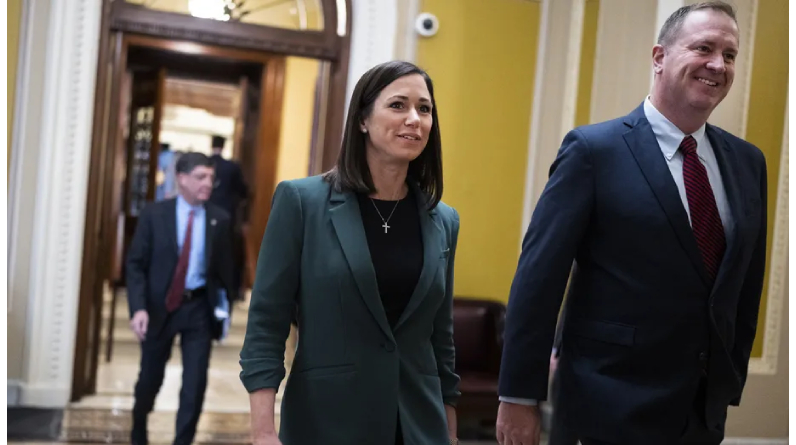One of the few Republicans who voted to remove former President Donald Trump from office was Sen. Richard Burr (R-NC), but he is no longer in office. Sen. Ted Budd (R-NC), a former House member who vigorously challenged the 2020 election results, currently holds his seat in place of him.
It’s a distinction that reflects a bigger pattern in the Senate: After the midterm elections, several Republicans were replaced this term by more aggressive and, in some cases, more conservative lawmakers. Although some of these candidates may alter their viewpoints once they are in the Senate, several of them are entering Congress with positions that are substantially more to Trump’s right than those of his predecessors.
“Many of the Republicans who lost the Senate weren’t Trump supporters. Pro-MAGA candidates are taking their place, according to Jessica Taylor, a Senate analyst for Cook Political Report. Sens. Budd, JD Vance (OH), Eric Schmitt (MO), Markwayne Mullin (OK), Katie Britt (AL), and Pete Ricketts (NE) are the six new Republicans who will be joining the Senate this year; four of them have previously supported election denialism. Meanwhile, all of the Republicans they are replacing voted to certify the results of the 2020 election.
Since candidates who win party primaries in smaller states are likely to win general elections, the Senate’s recent small-state bias has benefitted Republicans, a trend that could result in the election of more conservative legislators in the long run. Republican primary winners in these states have also fared better in general elections as red states like Ohio and Missouri have also tended to trend more that way.
There may be several effects from the entrance of these new MPs. Moving forward, it might be more difficult for both parties to reach bipartisan agreements on ambitious legislation due to the departure of some more centrist dealmakers. Despite the disapproval of many people, Trump’s election denial may gain more traction. Additionally, as Congress prepares for political battles over sensitive matters like the debt ceiling and government spending, a Senate with more members willing to adopt extreme positions could encourage potentially disastrous grandstanding.
Brian Riedl, a fellow at the Manhattan Institute and a former aide to Sen. Rob Portman, claims that we might see a more aggressive Republican caucus in the Senate that acts a bit more like the House.
Several newly elected Republican senators endorsed Trump in order to win
Six new Republican senators are joining the conference this session. One of these members was just appointed after Nebraska Sen. Ben Sasse said he would be leaving to become the president of the University of Florida. Five of these lawmakers were elected during the midterm elections. Here is a comparison between the new members of Congress and the departing senators.
Sen. Rob Portman is replaced by Sen. JD Vance, the new senator from Ohio. Vance, the best-selling author of the bestseller Hillbilly Elegy, based a large portion of his campaign on his support for Trump and provided evidence to support his allegations that the results of the 2020 election were fraudulent. Portman advocated for help to Ukraine and backed the actual outcome of the 2020 election. He has also been a dealmaker on matters like infrastructure. Vance has advocated for greater transparency on the aid the US is giving Ukraine and has criticised a number of bipartisan bills, including the deals on infrastructure and gun control.
Also Read :Washington D C Winter Session Students Get a Crash Course in Real Politics
Vance has said that, despite his earlier criticism of Trump, he has since changed his opinion and now supports “America First” policies like tough border security and immigration controls. He also allied himself with other MAGA party members throughout the campaign, such as Reps. Marjorie Taylor Greene (R-GA) and Matt Gaetz (R-FL), and he promoted his support for both Trump’s populist trade plans as well as his support for an abortion ban.
Sen. Richard Burr is succeeded by Sen. Ted Budd of North Carolina. Budd previously held a position in the House and belonged to the libertarian Freedom Caucus. He abstained in the House on measures to tighten gun regulation and to safeguard same-sex unions, which were supported by Sens. Richard Burr and Thom Tillis, the other senator from North Carolina. Budd supported a lawsuit intended to invalidate the 2020 election results, in contrast to Burr, who criticised Trump’s baseless challenge of them.

JD Vance and Ted Budd are grinning as they stroll side by side through a hallway with arched doors and a mosaic floor made of gold and brown tiles.
Ted Budd and JD Vance. Getty Images via Anadolu Agency
Roy Blunt’s successor as senator from Missouri is Sen. Eric Schmitt. When Schmitt was the state’s attorney general, he pursued litigation to overturn local mask bans and backed legal challenges to the results of the 2020 election. As a significant Republican on the Appropriations and Rules Committees, Blunt assisted in advancing bipartisan initiatives, such as one that increased spending for mental health. He voted to certify the election results and stressed the value of working across party lines.
After the former president endorsed “Eric,” it was unclear if he was endorsing former governor Eric Greitens or Schmitt. Schmitt then claimed Trump’s backing in the Missouri election. Additionally, Blunt backed the bipartisan infrastructure and gun control proposals that Schmitt opposed.
Oklahoma’s next senator, Sen. Markwayne Mullin, succeeds Sen. Jim Inhofe. Although Mullin, a former House representative, helped to protect the Capitol on January 6th from rioters, he was one among those who voted against certifying the results of the 2020 election. Like Inhofe, Mullin has previously backed providing aid to Ukraine. Along with his plan to erase Trump’s second impeachment, he is well-known for his errant attempt at a rescue operation in Afghanistan after the Biden administration withdrew troops from the nation in 2021. Inhofe has previously overseen discussions on Congress’s yearly military bill, and he did not contest the election results. Mullin, in many ways, symbolises a continuation of the late senator’s legacy given his support for conservative causes and occasionally vehement contributions to discussions.

Schmitt and Britt are grinning as they move into a hallway with tiled floors and yellow painted walls.
Senators Eric Schmitt and Katie Britt. via Getty Images, CQ-Roll Call, Inc.
Sen. Richard Shelby is replaced by Sen. Katie Britt, the new senator from Alabama. Prior to this, Britt led the Business Council of Alabama and served as Shelby’s chief of staff. In the state’s Republican primary, Britt was viewed as the more mainstream candidate; Trump first backed former Rep. Mo Brooks but then switched to Britt.
In the 2020 election, Britt has expressed concerns about “fraud,” but she hasn’t directly contested the results. Along with adhering to her conservative Christian convictions regarding topics like abortion rights, she concentrated on bolstering border security. Shelby has played a key role in negotiating spending agreements in Congress as the top Republican on the Appropriations Committee. However, he has recently come under fire from House Republicans for negotiating a deal with Democrats before the GOP assumed control of the lower chamber. He also cast a ballot to certify the 2021 election results.
Pete Ricketts, a former governor of Nebraska, has been chosen to take Sen. Ben Sasse’s place as Nebraska’s new senator. Ricketts, a member of a wealthy banking family, has supported Gov. Brian Kemp in Georgia as an example of how he has opposed Trump’s choices in other Republican primary contests. Ricketts campaigned to reinstate the death sentence in the state and oversaw tax reductions while serving as governor. Sasse gained notoriety for opposing Trump and is one of a small number of Republicans who voted to remove the former president from office during the uprising on January 6.
These modifications might have an impact on policy
Even while it only affects a small number of senators, this change in the Senate GOP may make it more challenging to accomplish bipartisan legislation in a Congress that is already clearly split.
It will be felt that the Senate lost some of the senators who were more prepared to compromise, according to Taylor. “We’ve seen a trend of more ideological members replacing more pragmatic, middle-of-the-road lawmakers continue.”
Democrats require the support of at least nine Republicans in order to pass most bills in the Senate, which has a 60-vote filibuster threshold. Republicans must also be willing to work with them to develop more comprehensive legislation, which is a crucial role that former members like Portman have performed.
In addition to guiding the infrastructure package, Portman was a key negotiator on a bipartisan CHIPS plan that concentrated on the US supply chain and an early proponent of legislation to codify safeguards for same-sex marriage. Blunt also worked on agreements for mental health services and legislation such as the Electoral Count Act. Additionally, Shelby played a crucial role in annual discussions on the amounts of defence and nondefense spending as the senior Republican on the Senate Appropriations Committee. Senator Pat Toomey (R-PA), a Republican who supported gun control legislation from both parties, has also announced his retirement. Sen. John Fetterman, a Democrat, currently holds his position.
Sen. Chris Coons (D-DE), a Democrat who has worked in multiple bipartisan “gangs,” said to Vox: “I was sorry to see colleagues like Sen. Portman and Sen. Blunt leave Congress this year, because I knew despite our many ideological and policy differences, they were honest brokers when it came to discussing common sense solutions to the pressing challenges of our time.” He added that he looked forward to developing more of these relationships, “including with newly elected members of Congress.”

From behind, Coons wraps his arms around Portman’s neck. Both are dressed in a shirt and tie and have taken off their blazers. Portman grinned widely, his white hair flapping in the breeze.
At the CHIPS Act signing ceremony at the White House in 2022, Sens. Chris Coons and Rob Portman embrace. via Getty Images, Tom Williams/CQ-Roll Call, Inc.
According to Politico’s Marianne Levine, numerous bipartisan bills, such as those pertaining to infrastructure, appropriations, and gun control ended up receiving support from more than 10 Republican senators during the previous term, indicating that they may still have the necessary support even after the departure of these seasoned senators. However, she observes that some measures, like as the same-sex marriage bill, had closer margins.
With just two votes needed to end the parliamentary filibuster, Portman, Burr, and Blunt were among the 12 Republicans who supported the same-sex marriage legislation that the Ohio senator also assisted in sponsoring. Three of the 11 senators who endorsed a short-term agreement to allow Democrats to increase the debt ceiling in October 2021 are retiring, which might be seen as a preview of the battle that will take place the following year.
Additionally, a number of Republican members are still open to making concessions. Immigration reform is a topic that has long presented difficulties for lawmakers, but Tillis and Sen. Kyrsten Sinema (I-AZ) have made it clear that they’d like to see something done about it. As the top Republican on the committee working with Chair Patty Murray (D-WA), Sen. Susan Collins (R-ME) is also likely to take a more bipartisan approach to spending. She has been a significant participant in many concessions this term, including promoting same-sex marriage safeguards.
Additionally, some of the newly elected Republicans, particularly those who represent swing states, might suddenly shift to the centre. According to a 2016 research by political scientist Kristina Miler at the University of Maryland, lawmakers who switch from the House to the Senate ideologically tend toward the centre to better represent their larger electorate. A conservative member of the House, for instance, might become more moderate once they are in charge of a state with a wider range of political opinions.
“It all depends on whether the new senators want to change the world or just gain notoriety on television. Let’s hope it’s the former, says Republican pollster Whit Ayres.
Given the makeup of the Senate, Democrats can pass legislation without the help of any of the new GOP senators provided they can persuade other Republicans to support them. However, it doesn’t decrease the potential influence of the new members. The new senators might be more inclined to engage in unusually heated debate during hearings and during floor proceedings. This might exacerbate partisan strife, complicate hearings for candidates supported by the Biden administration, or possibly impede down the passage of important legislation.
Additionally, it might raise the status of new members. For instance, during Senate Judiciary hearings, conservative senators like Josh Hawley and Marsha Blackburn asked inquiries that centred on culture war themes, such as anti-trans speech. This earned them favourable attention in the conservative press.
Even when I was working for the Senate earlier, Riedl adds, “I saw it trending as being more about message, gimmicks, symbolism, and party fights, rather than putting your head down and closing things.” The next debt ceiling battle could be a pivotal opportunity for the newly elected Republicans in the Senate to abandon the aggressive characters they developed while campaigning, or to further embrace them.
It’s also interesting that the group of Republicans prepared to actively challenge Trump is also shrinking as the 2024 election — and a hypothetical second Trump term — approach. Three of the seven Republican senators—Burr, Sasse, and Toomey—who supported the conviction of Trump in his second impeachment trial are no longer in office. Meanwhile, a number of the new members have backed Trump’s election denial and depended on his support to win office.
In the case of another closely contested election, this shift might exacerbate already-existing divisions within the Republican conference and potentially constitute a long-term threat to democracy. Early this year, a group of conservative Republicans rejected the re-election of Sen. Mitch McConnell (R-KY) as the party’s leader, exposing some of the divisions within the Senate GOP.
Conflicts over the party’s policy agenda and the procedures for creating bills were among those difficulties, and they may continue to be areas of dispute in the future. A bigger number of election sceptics in power might potentially encourage more people to challenge future outcomes.
Gunner Ramer, the political director of the Republican Accountability Project, an anti-Trump Republican organisation, believes that it “it is an indictment on the modern-day GOP that the adoption of election denialism helps you win primaries.” “With these firebrand conservatives who manage to win a Republican primary, we’re going to see what type of legislating truly happens.”



Leave a Reply